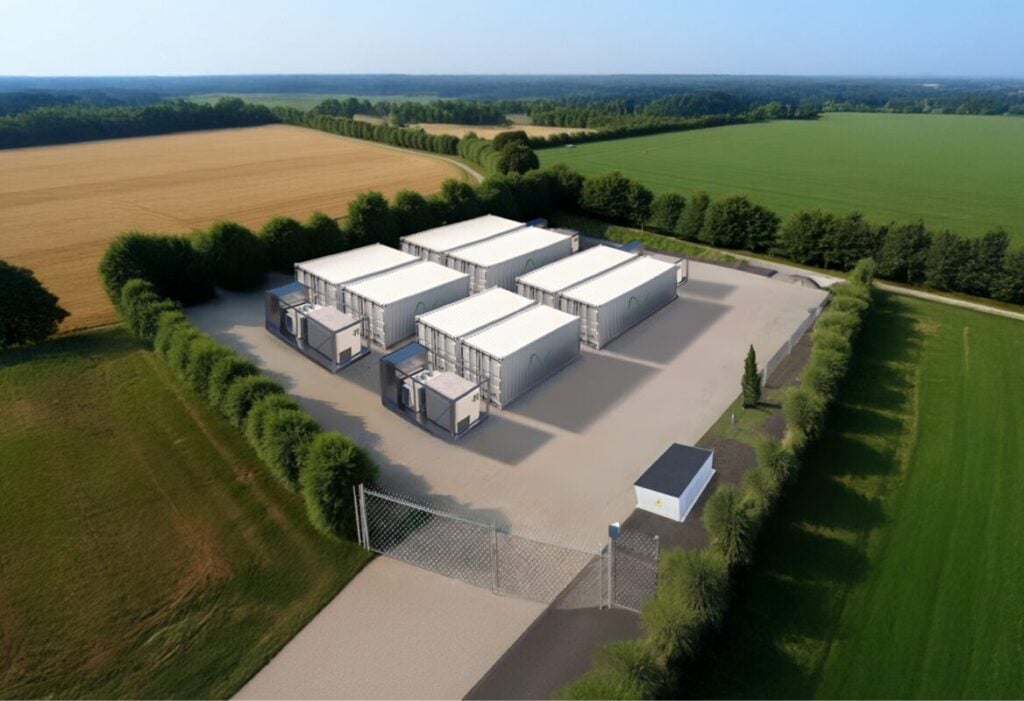
We caught up with the CEO and strategy director of ‘green flexibility’, a BESS platform in Germany whose management team is largely made up of executives formerly from residential battery and VPP firm sonnen.
Green flexibility was recently invested in by the private equity investor Partners Group, which has committed to putting €400 million (US$416 million) into its battery energy storage system (BESS) pipeline. CEO Christoph Ostermann told us Partners is a good fit thanks to its energy sector expertise and European background.
Enjoy 12 months of exclusive analysis
- Regular insight and analysis of the industry’s biggest developments
- In-depth interviews with the industry’s leading figures
- Annual digital subscription to the PV Tech Power journal
- Discounts on Solar Media’s portfolio of events, in-person and virtual
The BESS owner-operator is headed by Ostermann, co-founder and CEO of sonnen for 11 years, while its CTO Herrmann Schweizer, COO Christoph Lienert and strategy director Christina Hepp all spent long stints at sonnen too.
Founded in 2010, its fair to say that sonnen – currently owned by Shell, for now – was an early mover in energy storage while green flexibility was founded in 2023, a relative latecomer.
Indeed, Ostermann told Energy-Storage.news that an oversaturation of the project development market in Germany is set to lead to a shake-up, partially because of new measures being brought in by grid operators to weed out the non-serious projects.
Grid operators in Germany ‘overwhelmed’
“Three years ago the German grid-scale market didn’t really exist and now it’s exploding. There are tons of players, some being solar and wind developers coming in because their core business isn’t doing well. This leads to a run on the grid operators who are overwhelmed at this point. We feel the hype is coming to an end and market is consolidating,” Ostermann said.
“Grid operators are implementing measures, namely a a construction cost charge they put on companies like us. It means to access the substation you have to pay for the construction with an upfront payment. This is nothing else than a selection mechanism to filter those out who are not seriously or professionally pursuing their projects.”
He said the size of this fee, between €50,000-180,000/MW and requiring a 50% downpayment, should reduce the number of applications and in turn spark a period of consolidation.
“A lot of players are not well-funded, don’t understand storage business and technology, which is not simple, and has a very untransparent landscape of suppliers. We see projects labelled ready-to-build that are not. The marketing flexibility players see a similar thing, and this leads to the perception that market is running ‘hot’ but will cool down’.
EPC, self-integrator and project owner-operator
However, note that Ostermann doesn’t consider green flexibility a developer. The firm does the engineering, procurement and construction (EPC) parts of the projects and “wants to keep these projects on our books and run them”, Ostermann said.
An average leverage of 60-70% for BESS that Ostermann combined with Partners’ investment cited means roughly €1 billion can be invested in its BESS projects.
“We are focused on Germany but our ambition is to become a pan-European player. We focus on projects with a minimum size of 10MW. Everyone wants the larger projects, and in theory it is the same work developing 10MW as 100MW, but the problem is larger projects of 50-100MW or above have a longer timeline.”
“We were founded around one year ago and by autumn already had a project ready-to-build. If you just focused on 100MW or above, you’d be out of work for the next 3-5 years. We structured our project portfolio to get those smaller projects up earlier and at the same time develop longer-term ones.”
The company will work with third-party optimisers that “have been around for years” for monetising its projects, as it is “not our ambition to build something better by ourselves”, Ostermann said. It has selected three optimisers and will give them projects to see how they perform.
One area where he claims green flexibility will be differentiated from others in Germany is having commercial agreements directly with regional system operators, as often the electricity market price may not be the best indicator of local needs.
On technology, green flexibility will buy BESS units directly from suppliers, primarily CATL, and integrate them itself. This is relatively unique in the energy storage industry though is an increasing trend as the industry matures, and the team’s background will help with this.
Zonal price reform
That last point is a useful segue on to the conversation around zonal pricing reform that Germany is having, similar to the REMA consultation in Great Britain (GB).
Strategy director Christina Hepp said: “There is a lot happening around the topic and it’s a directive of the EU. There are lots of contradictory opinions; the TSOs were meant to offer their opinion already but nothing will happen until the federal elections in two weeks.”
“The most common view is that there would be two price zones, but it’s unclear exactly what that would mean in practice. The basics are that the south [where demand is concentrated] would be expensive and the north [where renewable generation is] would be cheaper. Something will change.”

